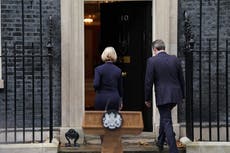Pound hits lowest level this week amid political uncertainty
Sterling dropped by 1.16 per cent to 1.110 against US dollar on Friday
Your support helps us to tell the story
From reproductive rights to climate change to Big Tech, The Independent is on the ground when the story is developing. Whether it's investigating the financials of Elon Musk's pro-Trump PAC or producing our latest documentary, 'The A Word', which shines a light on the American women fighting for reproductive rights, we know how important it is to parse out the facts from the messaging.
At such a critical moment in US history, we need reporters on the ground. Your donation allows us to keep sending journalists to speak to both sides of the story.
The Independent is trusted by Americans across the entire political spectrum. And unlike many other quality news outlets, we choose not to lock Americans out of our reporting and analysis with paywalls. We believe quality journalism should be available to everyone, paid for by those who can afford it.
Your support makes all the difference.The pound has slid to its lowest level this week as downbeat economic data and the prospect of political uncertainty increased nervousness in the financial markets.
Sterling fell by 1.16 per cent to 1.110 against the US dollar on Friday morning. The pound was also down 0.64 per cent at 1.14 against the euro.
However, by the end of the day it had managed to claw back its losses and was back up by 0.56% against the dollar to 1.1298.
The cost of government borrowing increased as yields on gilts, UK government bonds, rose by around 2%, or 0.08 percentage points, to 4.04 per cent.
The poor performance by the pound and stocks in London has been partly caused by weaker-than-expected economic data.
Earlier on Friday, official figures showed that government borrowing struck £20 billion last month, more than £2 billion more than economists had expected.
The increase in borrowing has been driven by higher debt interest due to rising inflation.
Meanwhile, the Office for National Statistics revealed that retail sales slipped by 1.4 per cent last month, which was notably worse than the 0.5 per cent decline a consensus of experts had predicted.
The pound had a strong Thursday as it moved higher following Liz Truss’s announcement that she will resign as prime minister following a 45-day spell in charge which resulted in turmoil across the markets.
These gains fell away on Friday as traders await certainty, particularly ahead of the fiscal announcement and Office for Budget Responsibility (OBR) forecasts due on 31 October.
Matthew Ryan, head of market strategy at Ebury, said: “Even following Truss’s resignation the pound is not out of the woods just yet, with sterling giving up much of its gains yesterday afternoon.
“Uncertainty in British politics remains rife, which will do little to inspire confidence in UK assets.
“The next prime minister and Tory leader is expected to be chosen by next Friday. There have been reports that Boris Johnson is ready to throw his hat back in the ring, but we see another stint for the former PM as highly doubtful.”


